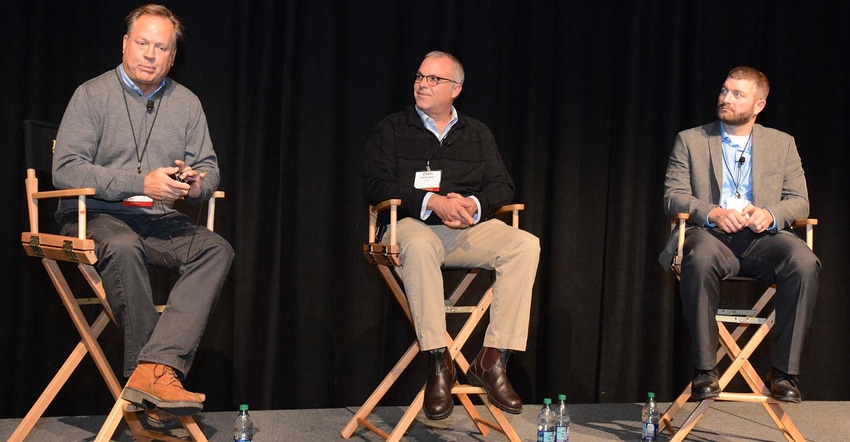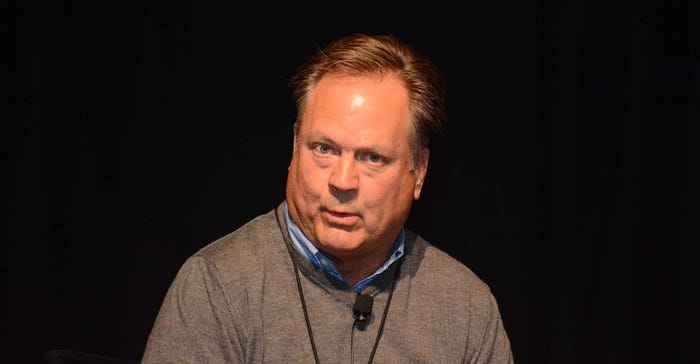
“If we’re successful in what we’re trying to do, our goal is to make our retailer irrelevant. My whole business model is relying less on the traditional distribution model.”
With that shot across the bow I looked nervously around the room for initial reactions among the hundreds of agribusiness leaders and ag retailers gathered at Purdue’s recent National Conference for Agribusiness. These folks were hear to learn about farmer buying habits and discuss the university’s most recent Large Commercial Producer Project. The underlying theme: how can retailers be more relevant to the needs of large farmer customers?
When it came to three of those large farmers serving on a panel, the audience got an earful.
The ‘irrelevant’ comment came from Dan DeSutter, respected as a straight talker when it comes to his views on agriculture. After an early career as a broker, he came back to the Attica, Ind., family farm and began focusing on soil health, no-till, cover crops, a grass-fed beef operation, and soon, organic production. A third of his soybean crop needs no crop protection chemicals whatsoever thanks to cover crop weed suppression.
“Organic is the fastest growing segment of ag today,” he says. “You have a millennial generation that has embraced it. We feel the better margin is to get closer to the consumer.”
Joining DeSutter were Dug Radcliff, a Circleville, Ohio grower, and Brett Hermann, who manages Frontier Farms in De Land, Ill. Some themes quickly emerged:
-- these farmers don’t care how dad ran the farm;
-- they are keen to manage risk;
-- they are confident in their ability to make money, with or without the help of a retailer;
-- they have grown their farms rapidly and expect the growth opportunities to continue; and
-- they’re open to working more closely with said retailers, provided those retailers can serve some useful purpose other than just sell them stuff.

Dug Radcliffe: “Anything we can do to eliminate risk, we’re going to try to do that.”
Growth drives the discussion
Growth is a big reason why the relationship with retailers is in flux.
“We’re not trying to farm every acre, but we are trying to consistently expand the operation,” says Hermann, who worked in ag lending before farming. “The opportunity to grow today is much greater than three or four years ago. There’s a lot of guys in their 60s and 70s who made more money in 2008, and they’re scratching their head wondering if it’s time to get out. That’s going to provide tremendous opportunities.”
To be sure, a lot of farm growth is coming in chunks, not 80-acre parcels. This past winter Frontier Farms formed a partnership with three other operations. The goal is to grow 10% each year.
“Going forward, the growth is just going to look different,” Hermann says. “You have to figure out how to make it work, take those opportunities on, and manage the risk.”
Radcliff took a different path. He is a first-generation farmer who worked in agribusiness 30 years. When his two boys came back from college they entered the seed business, which led to custom fertilizer applications.
“Those farmers came to us and said we want you to farm our farms, so in the last four years we’ve amassed a lot of acreage,” says Radcliff, who farms 4,000 acres with his two sons in four separate LLCs. They own 20% of their land base with a goal to purchase and own more of their base in future.
Retailer reality check
To be sure, large farms still need retailers, especially if they get in a pinch and need an extra application, seed or other service. But things are changing. Purdue’s survey reveals big gaps between what farmers and retailers believe is important in a buying decision. When deciding on a seed purchase, nearly two-thirds of the large farmers ranked seed performance most important, followed by price; only 5% said it was due to retailer relationships. When retailers were asked the same question only 27% said performance was most important; 26% believed the buy was due to their relationship with the farmer.
When asked to rank management factors – costs, people, production, price or assets - as most important to their success, large farms ranked people and costs as most important (31%).
“The larger the farm, the more important managing people is to their success,” says Purdue economist Allan Gray. Young farmers age 18 to 39 put substantial weight on people management as key to their success, followed by cost and production. “The hypothesis is, these younger people have responsibilities that their fathers did not have,” says Gray. “They are responsible for production but they may have to manage people to get that production done.”
Yet, when retailers were asked to rank the same five management factors for success of large farms, they ranked ‘people’ last.
“Retailer relationships are important,” says Hermann. “But as we grow, the things we used to depend on them for, we no longer do. Our needs are a lot different than what they were five years ago.”
Large farmers are more apt to look beyond the traditional retailer relationship that mainly focused on sales. They may look to retailers to partner in new business ventures or work with them on side businesses like drones, crop dusting or trucking.
“We’re entering that era where we don’t need to be a full service customer any more, but we still may need certain services,” says DeSutter. “We’re looking at business benefits that are good for us and for them.”
Absolute confidence
The other take away – for me, anyway – was how absolutely confident these farmers were in the vision each one had for the future of their business, despite four years of mediocre grain prices.
“We don’t care what grandpa did or what the neighbor did,” says Radcliff. “We’re going to do the processes that we need to do to be successful. Farming is a big puzzle and you need to put all the pieces into place.
“The opportunities for growth are immense, particularly for my sons,” he says. “They will be able to pick and choose what they want to farm. We can do a better job on these farms than those farmers did before.”
The opinions of the author are not necessarily those of Farm Futures or Farm Progress.
About the Author(s)
You May Also Like






